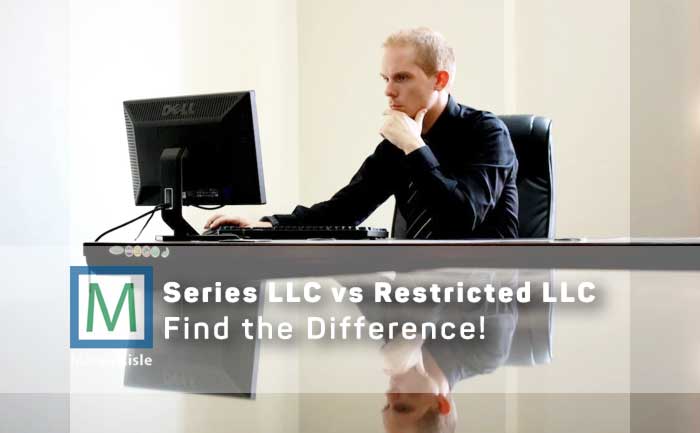Series LLC vs Restricted LLC: Running a business through the formation of a limited liability company (LLC) can be an advantageous move for many entrepreneurs. However, with so many different types available, it is easy to get stuck when deciding which one is best suited for your needs.
This series LLC vs restricted LLC article will help you clear your confusion between these two LLCs.
What is a Series LLC?
A series limited liability company (SLLC) is a type of LLC that allows the company to create separate divisions or “series” within the company, each with its own assets, management, and liability protection. This structure is often used to protect assets within the company and to manage risk.
A series LLC consists of a master LLC amalgamating several separate divisions under one single entity. Standing for Limited Liability Company, the series LLC is a great option that allows legal protection of each individual section within the umbrella structure.
It creates common responsibility but with each subcomponent holding its own assets and debts. In this regard, the series LLC resembles a holding company but in a holding company, you need to separately register each company under the ultimate holding company. (See series LLC vs holding company)
What is a Restricted LLC?
A restricted LLC is a special type of LLC only available in Nevada. Business owners in Nevada used it as a vehicle for transferring businesses assets, properties, or land allowing its owners to pass on these assets tax-free.
Also, see “Step-up” in basis at the death of LLC member” a way of tax-free transfer of investments and other assets to the heirs.
Restricted LLCs have default restrictions on the time frame when profits from the LLC can be paid out. After the formation of a restricted LLC, it cannot make distributions to its members for 10 years. During this time period, the LLC cannot be taxed.
The general purpose of a restricted LLC is to pass the assets from one family member to another while avoiding taxation and personal liability pertaining to a specific asset. While restricted LLC formation, the restricted status must be specified in the LLC articles of organization.
Series LLC vs Restricted LLC: How are they different?
Here are some key differences between series LLCs and restricted LLCs:
1. Structure
Series LLCs comprise several cells, each acting as a separate legal entity with its own assets, liabilities, property, and business objectives. Whereas restricted LLCs don’t have separate entities, assets, members, or managers into different groups.
2. Formation
Though both series LLC and restricted LLC are formed by filing articles of organization with the state in which the company will be registered. However, in the formation documents, the difference is that the forming LLC needs to specify whether that LLC is a restricted LLC or has the right to form multiple series under its umbrella.
3. Governing laws
Series LLCs and restricted LLCs are both governed by the laws of the state in which they are formed. Only, Nevada allows the formation of restricted LLCs while only 12 states and two U.S. territories allow Series LLCs in their legislation.
Moreover, series LLCs may be subject to additional laws and regulations related to their unique structure.
4. Business Goals
A restricted LLC is a temporary business model designed to serve as a vehicle for transferring assets to family members. In this sense, it is more of a family business and not suitable for conducting long-term operations.
Series LLCs, on the other hand, are formed to manage multiple businesses or assets each with its own owners, management, liabilities, and finances.
Series LLC vs Restricted LLC: How are they different?
Here are some key features that are similar between series LLCs and restricted LLCs:
1. Limited liability protection
Both series LLCs and restricted LLCs offer liability protection to their owners (called “members” in an LLC). This means that the personal assets of the members are generally not at risk if the company is sued or incurs debt. However, the liability protection offered by a series LLC may be stronger because each series within the LLC has its own separate liability protection.
2. Flexibility in Taxation
Both series LLCs and restricted LLCs can choose how to be taxed. So, they have the flexibility to be taxed as an S corp, C corp, or disregarded entity. If the LLC is taxed as an S corp or disregarded entity, the profits and losses of the company are passed through to the members and are reported on their individual tax returns.
If the LLC is taxed as a corporation, the company itself is taxed on its profits, and the members are taxed on any profits they receive from the company (double taxation).
Series LLC Advantages and Disadvantages
Given your specialized business circumstance and goals, here is how a series LLC can be beneficial or disadvantageous for you:
Series LLC is Best For
A series LLC provides entrepreneurs the same limited liability protection and tax benefits as a standard LLC (see Series LLC vs Traditional LLC) while allowing them to create separate divisions within the same entity.
This flexibility makes it an ideal choice for businesses with multiple branches or ventures they’d like to keep organized, as well as companies that need to manage different types of assets without running into legal issues.
Restricted LLC Advantages and Disadvantages
Depending on your specialized business needs, here is how a restricted LLC can be beneficial or disadvantageous for you:
Restricted LLC is Best For
If you are a resident of Nevada and wish to transfer ownership of assets such as a house, business, car, or any other asset to a family member, consider forming a restricted LLC. It will help avoid taxation and liquidation. The new and previous members will have no personal liability pertaining to the asset.
Conclusion
When comparing a series LLC vs a restricted LLC, it’s important to consider the variations in their legal requirements and benefits. It pretty much boils down to what kind of company you are looking to set up: if you need a way to transfer assets while avoiding taxes, a restricted LLC is the way to go.
However, if you have more ambitious plans that involve multi-faceted investment structures, then the series LLC may be better suited for your needs.
Whichever route you take, make sure that you plan ahead and take all regulatory aspects into account before incorporating your business as either a series LLC or a restricted LLC.

Aisha Noreen is an owner of a small business with more than 9 years of experience in the marketing industry. With the wisdom of an old soul, she always seeks innovation and mind-blowing ROI techniques. Her unique approach helped many small businesses thrive and she can surprise you in many ways as well. Believe it or not, her energy, passion, and creativity are contagious enough to transform your business and take it to another level.








